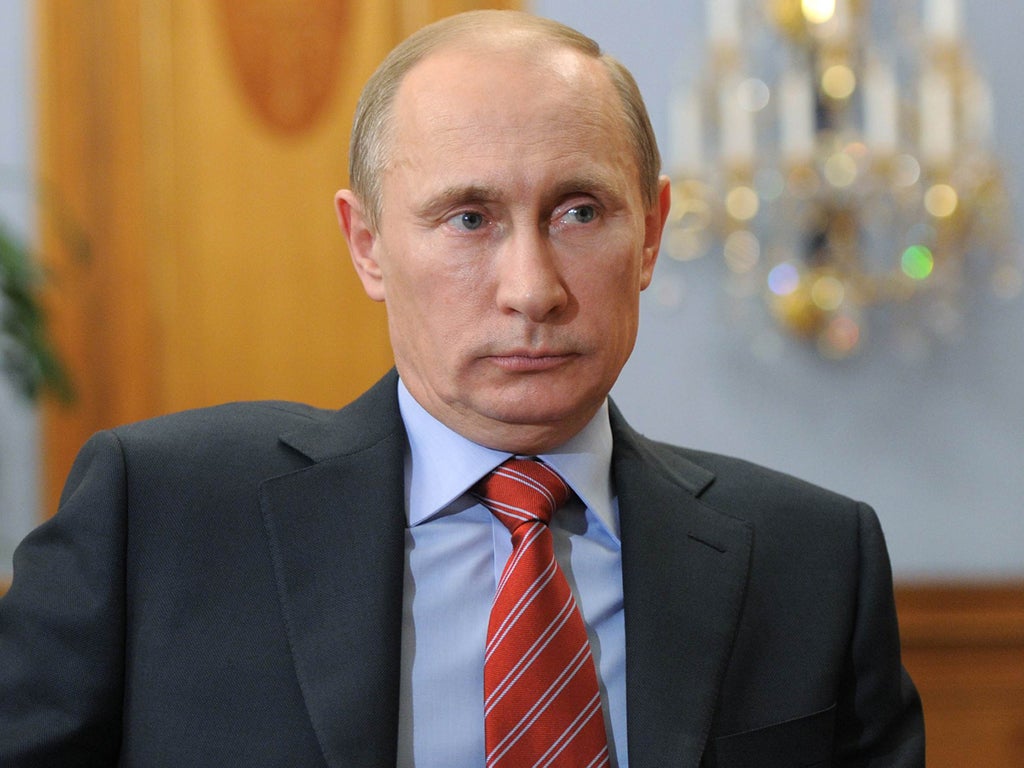Jonathan Meades on France, BBC4, Wednesday Putin, Russia and the West, BBC2, Thursday
It would help if he let us in on his Gallic joke, too. And, in Moscow, Putin is put under surveillance

The last time I saw Jonathan Meades he was gate-crashing a party, already well refreshed. In fact, he turned up legless, but by the time he left he was miraculously sober, a curious inversion of the norm.
In Wednesday's Jonathan Meades on France, the first in a three-part series about his adopted homeland, he was again intent on subverting expectations. Billed as "fragments of an arbitrary encyclopedia", a witty opening sequence announced there would be no strings of onions, no Dordogne, no Piaf. The France that has fascinated Meades since 1962, when he was 15, is a darker place, of muddy battles and secret shame.
For no apparent reason, he took the letter V as a starting point. This prompted a shot of a valise, and led him to discuss, with further randomness, Verdun, Vichy and Verlaine. Po-faced and deadpan, he would stand, looking incongruous in his trademark suit and Ray-Bans, delivering catty opinions on whatever took his fancy, interspersed with the occasional image of a horse's arse. Wackiness is his thing, and to be encouraged over the blandness that characterises most BBC presenters. But we could have benefited from a little method in the madness. Having established that there would be no string between his onions, the mini-essays were too often impenetrable.
One of the Vs was for Versailles, which Meades used as a peg for a bizarre attack on Charles de Gaulle, who is buried there. Though the ex-president famously made a broadcast from London in 1940, calling on the French to resist the Nazis, Meades calls him a "quasi-fascist" for his handling of the Algerian war of independence. This intriguing and complex period of history was summed up with a few languid assertions of the sort you'd expect of a dinner party bore. My interest was piqued by mention of the OAS, France's secret right-wing army, which opposed Algeria's independence, but elaboration there came none: Meades gave his oblique view, then you had to take it or leave it. It struck me that he wanted to leave us embarrassed in our ignorance, and by the time he was chuckling to himself as he introduced the next segment, Vexatious Litigants, it was clear that he was in on the joke, never mind if we weren't.
A more useful explanation of a complex historical period came in Putin, Russia and the West, the first of a four-part series charting the Russian president's apparently interminable supremacy. It's a timely story as, 12 years on, Moscow is witnessing its first serious protests against him.
Episode one told how he laid the foundations of power early, by getting tough with the oligarchs and Chechen rebels as soon as he succeeded Boris Yeltsin in 2000.
Documentaries about this time guarantee suspense, because you know that at any minute the voice-over will say: "And then came 9/11, and everything changed." Sure enough, the attack on the twin towers proved significant, as Putin sided with the US against the Taliban, proving conclusively that the Cold War was over. In fact, as Russia's then defence minister, Sergei Ivanov, explains, it was also a case of an enemy's enemy being an ally. "We knew where the training camps were in Afghanistan, we knew the exact map co-ordinates. Those camps trained Chechen rebels. We were counting on the Americans to liquidate those camps, I won't hide it." Lovely. As was the moment when he recalled, with ghoulish delight, having dinner with Putin the night the US started bombing, which happened to be Putin's birthday, 7 October. "This is a birthday present for you!"
A common response to past brutalities is to wonder: "Why did nobody stop it?" Here, we were shown footage of a Chechen villager being hauled out of his cottage by troops, begging not to be taken, while a voice-over tells us that his remains were recently found buried in a Russian camp, two bullets in his head. Documentaries like this always make the events of the recent past seem amazingly distant, and Colin Powell and Condoleezza Rice appear like figures from another age. Much more disturbing is the realisation that, while they have long gone, Vladimir Putin and his cronies have not.
Subscribe to Independent Premium to bookmark this article
Want to bookmark your favourite articles and stories to read or reference later? Start your Independent Premium subscription today.

Join our commenting forum
Join thought-provoking conversations, follow other Independent readers and see their replies